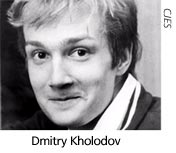New York, September 21, 2005—The European Court of Human Rights has agreed to hear charges that Russian authorities failed to properly investigate and prosecute the 1994 murder of Moscow reporter Dmitry Kholodov, the journalist’s parents told the Committee to Protect Journalists today.
Kholodov, a reporter for the independent newspaper Moskovsky Komsomolets, was killed in October 1994 after investigating alleged corruption involving high-ranking military leaders, including then-Defense Minister Pavel Grachev. Six defendants, four of them military officers, were tried in Russian courts but acquitted.
The reporter’s parents, Yuri and Zoya Kholodov, had asked the Strasbourg, France-based court to review the case for alleged human rights violations. The court notified Maksim Tadeushevich, a lawyer representing the Kholodov family, that it accepted the case. The court’s letter, dated August 24, arrived on Monday.
Kholodov, 27, was killed when a booby-trapped briefcase from a purported source exploded. Kholodov, who wrote extensively about corruption in the Russian military, had been told that the briefcase contained secret documents exposing corruption in the military’s highest ranks.
The official investigation into Kholodov’s slaying progressed slowly and drew extensive criticism from Kholodov’s colleagues and the Russian public. The first arrests came four years after the murder, and the subsequent court proceedings were marred by alleged irregularities. The Kholodovs have alleged that court officials falsified transcripts in the trials, that explosives experts provided false testimony, and that judges ignored important evidence.
“We expect justice,” Yuri Kholodov said. “We want to prove our case that there were obvious violations of the criminal code and the constitution committed by the Russian courts.”
The defendants were acquitted in separate trials in 2002 and 2004 in the Moscow Military District Court. The Military Collegium of Russia’s Supreme Court upheld the verdicts in March.
The European court has authority to review the actions of domestic courts, issue findings and recommendations, and levy monetary sanctions. The Kholodovs said they had not been given a date for an initial hearing.
“The European Court can send a powerful message by looking closely at the irregularities that have been reported in the Dmitry Kholodov case,” CPJ Executive Director Ann Cooper said. “For more than a decade, this murder has gone unpunished. This terrible injustice is compounded by the alarming link to the top levels of the military.”
In court, prosecutors said the defendants killed Kholodov on orders from Grachev. The defense minister, who was not charged, denied that he ordered the killing. The defendants were former intelligence officers Pavel Popovskikh, Vladimir Morozov, Aleksandr Soroka, and Konstantin Mirzayants; the deputy head of a security firm, Aleksandr Kapuntsov; and businessman Konstantin Barkovsky.
![]()
